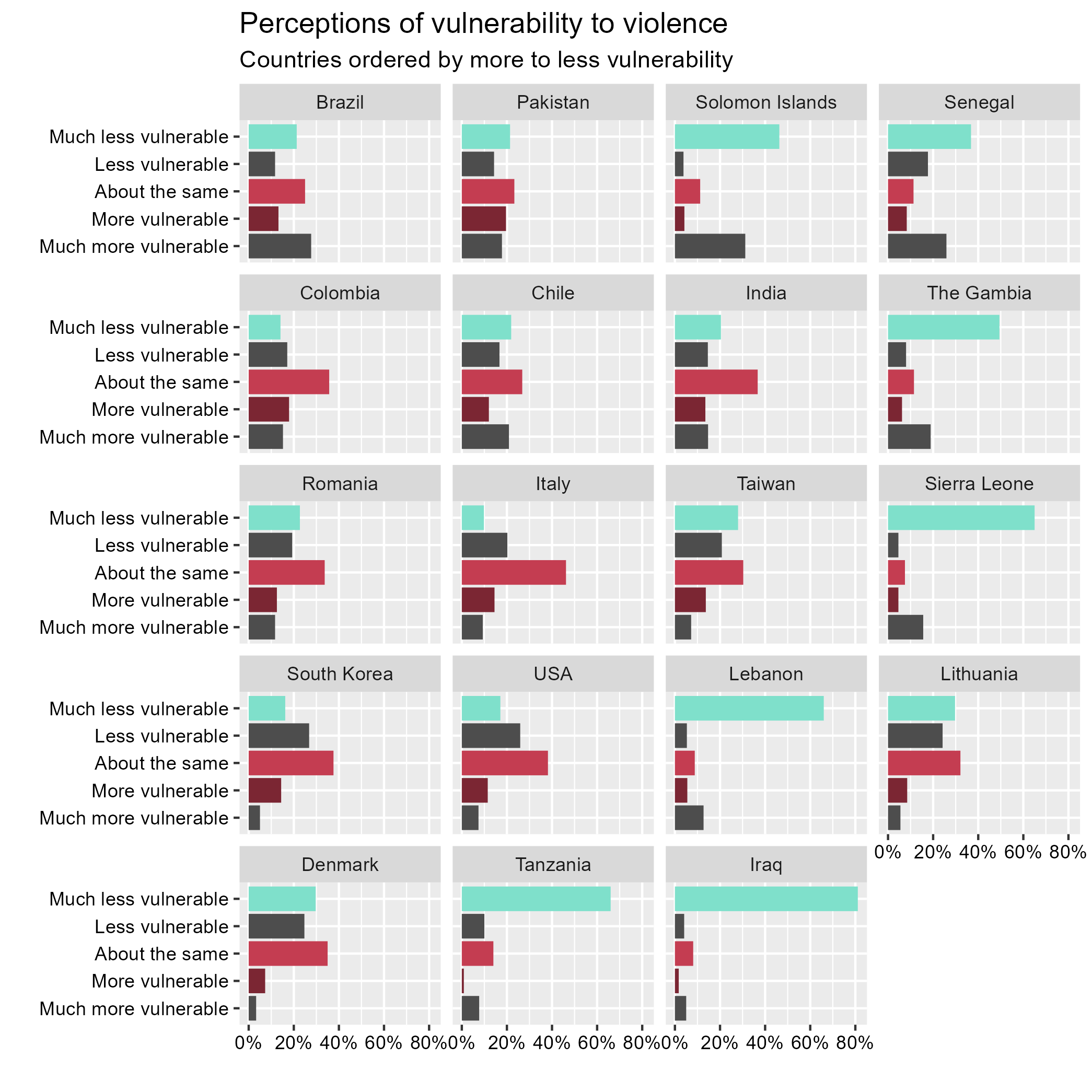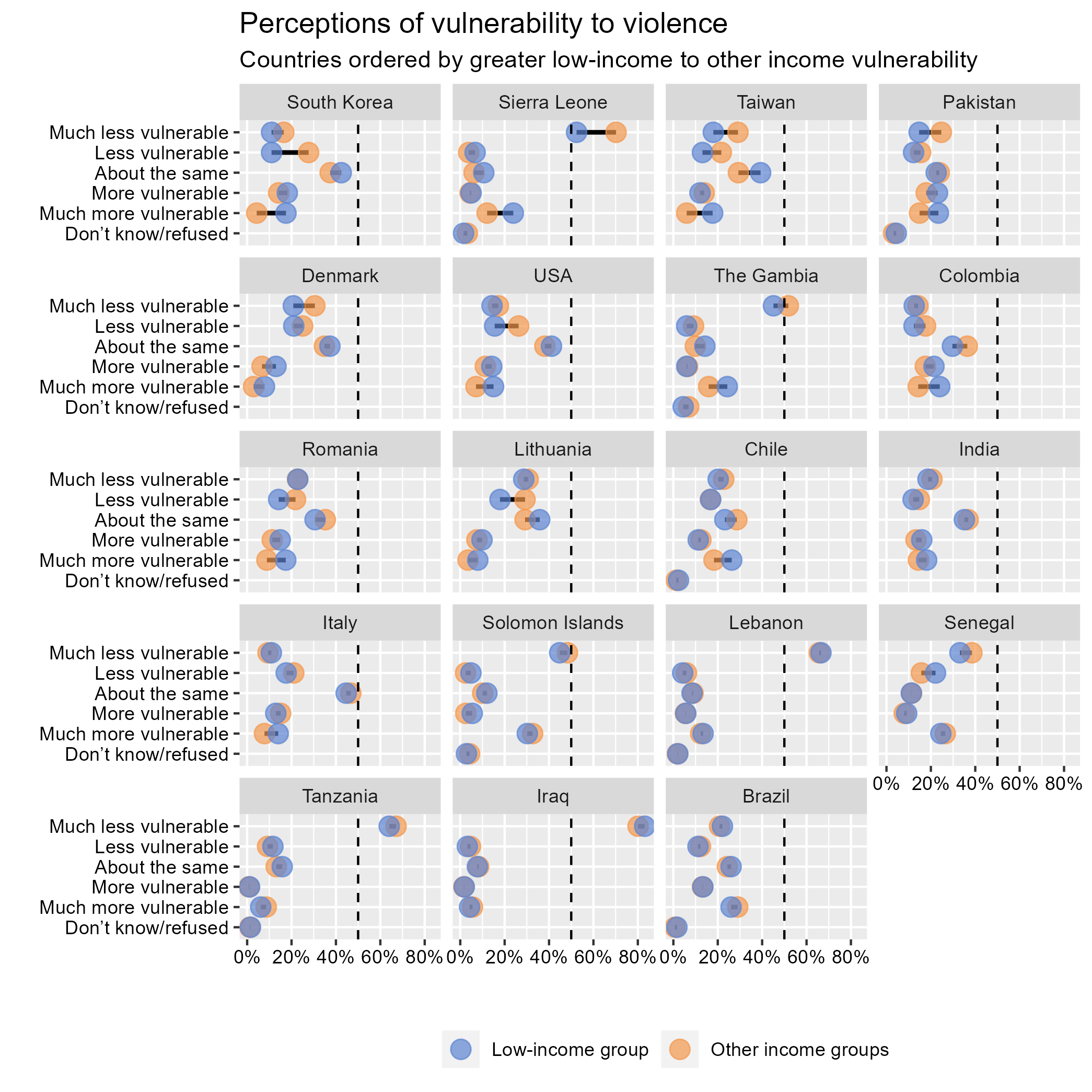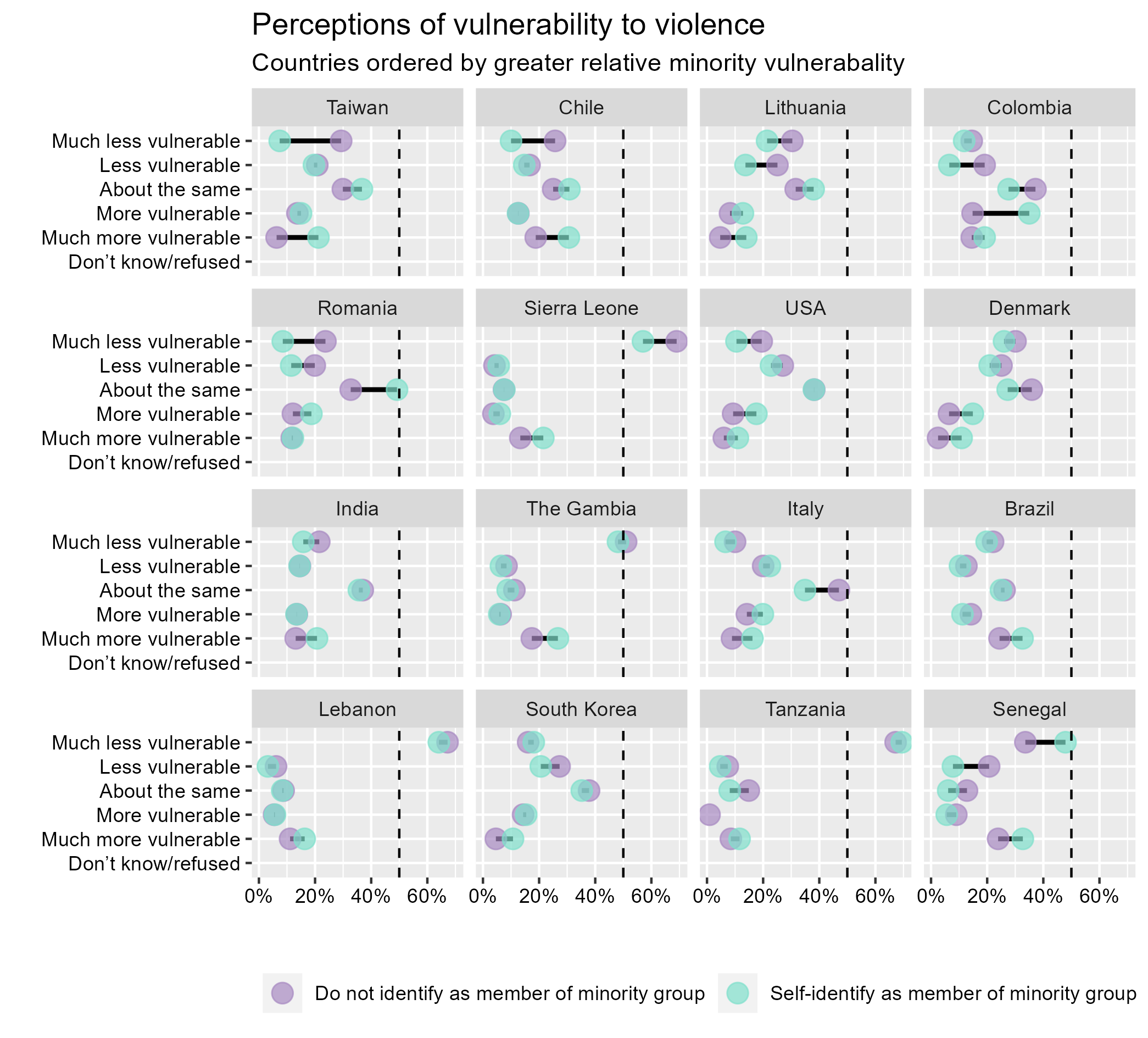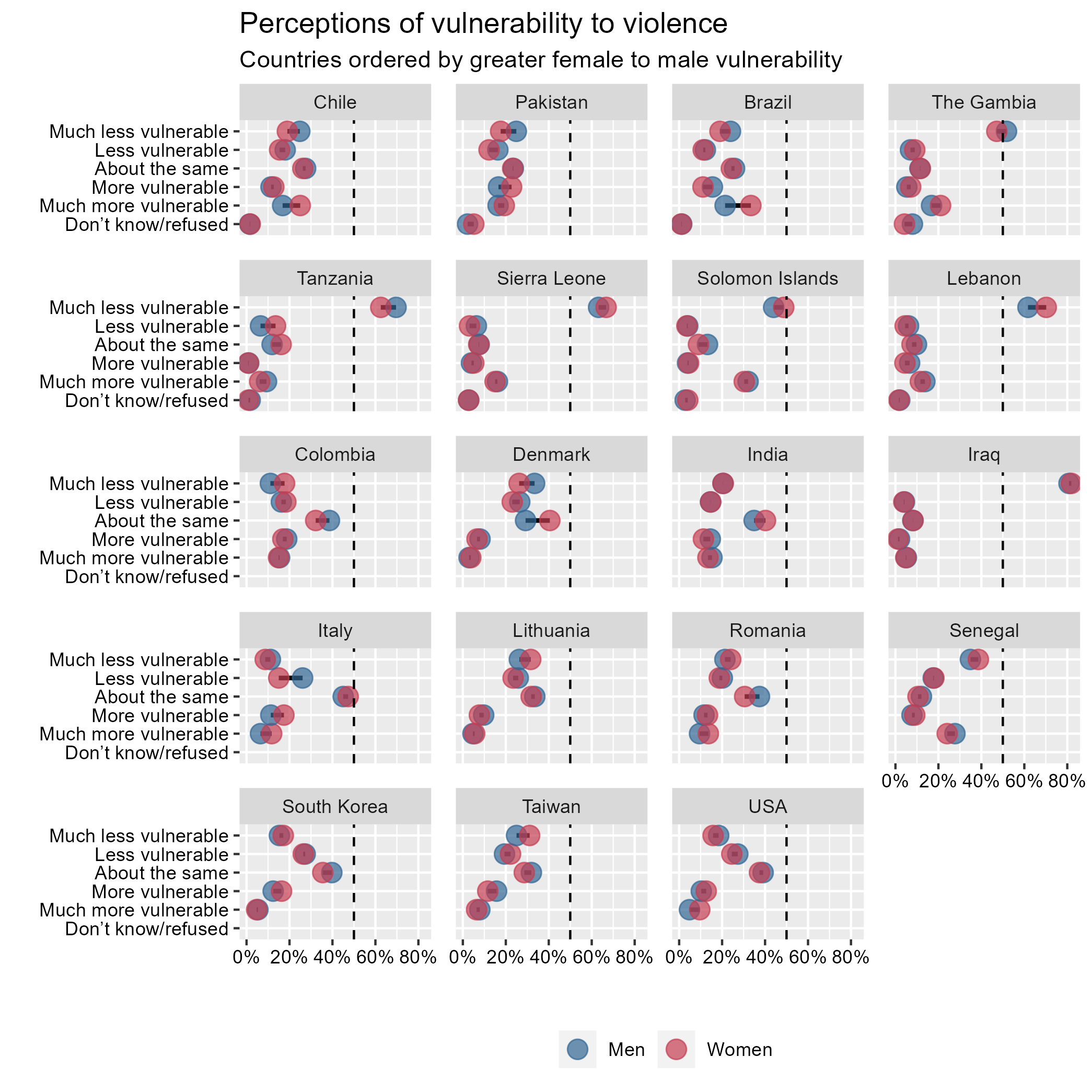Perceptions of violence in democracies: A PODS analytical brief

Disclaimer: Opinions expressed in this commentary are those of the authors and do not necessarily represent the institutional position of International IDEA, its Board of Advisers or its Council of Member States.
The Perceptions of Democracy survey (PODS) is a unique poll of people’s attitudes about democracy and access to democratic institutions. Unlike other perception surveys, PODS is designed to identify important but often neglected differences between various groups’ assessments of and attitudes related to democracy, namely between (a) experts and the public; and (b) representative groups and marginalized communities (the latter are made up of self-identified minorities and low-income groups). The countries surveyed were Brazil, Chile, Colombia, Denmark, The Gambia, India, Italy, Iraq, Lebanon, Lithuania, Pakistan, Romania, Senegal, Sierra Leone, Solomon Islands, South Korea, Tanzania, Taiwan and the United States.
The first PODS report covered access to political processes and institutions and perceptions of elections, courts, and rights, as well as the value of democracy, satisfaction with government and progress over time. This piece is the first in a series of blogs addressing other questions and issues in the PODS dataset that were not covered in the first report. The focus of this blog is a question that asked:
On a scale of 1 to 5, with 1 being much worse and 5 being much better, how vulnerable do you feel you are to violence, in comparison to others in [fill: COUNTRY]?
How do various populations experience vulnerability to violence in a country, and how does more acutely perceived exposure to violence influence political beliefs? This is a pressing question in a time of radical uncertainty, when political debate and discussion is increasingly inflected with doubts about the viability and desirability of democracy itself. Seemingly ubiquitous violence in El Salvador has led to support for authoritarian governance, but no corresponding political tendency has arisen in South Africa.
Is there a clear connection between violence in a society and perceptions of democracy, and if so, is it material, psychological, or some combination of the two? The Perceptions of Democracy Survey project attempted to answer this question by asking respondents in the 19 countries surveyed to rate their vulnerability to violence relative to their fellow citizens.
Distributions of violence
The distribution of responses in each country seen below in Figure 1 shows that perceptions of vulnerability to violence vary significantly between countries. While the consequences of real and structural violence are never evenly distributed, what is perhaps most striking is that the most common response across the dataset is feeling much less vulnerable in comparison to others in the country. Distributions also vary widely: in some countries perceptions are starkly polarized, in other ‘top-heavy’ countries nearly all respondents feel relatively secure, and in yet others a normal distribution – almost implying an even distribution of violence – prevails.
Figure 1 (click on image for enlarged view).
Source: Perceptions of Democracy survey.
Colombia, Italy, South Korea and the United States exhibit a normal distribution with answers grouped in the middle (i.e., feeling neither more nor less vulnerable than other citizens) and smaller groupings towards the extremes of ‘much more vulnerable’ and ‘much less vulnerable.’ The picture is quite different in a second group of countries that includes Iraq, Lebanon, and Sierra Leone, where respondents overwhelming report being shielded from what is–or was– otherwise a violent and disordered society. Despite much lower levels of violence, Tanzania joins these three in having a distribution of answer strongly skewed towards lower perceived levels of vulnerability. Past historical experiences may help to explain these answers. For example, Iraq is a country that spent much of the last two decades at near collapse, but which is currently benefitting from relative peace and prosperity in a time of high oil prices. Similarly, in Sierra Leone memories of a brutal civil war that ended in 2002 drive positive assessments of current security. The drivers of perceptions of relative security are less straightforward in Lebanon, a country in the midst of a world-historic state collapse, but respondents could be feeling more secure than their desperate fellow citizens robbing and taking hostages at banks in order to make ends meet.
The third group is countries that are polarized, such as Brazil, Chile, the Gambia, Senegal and the Solomon Islands, where respondents are more likely to report either being much less or much more vulnerable than the average citizen. While it is not surprising to see perceptions of vulnerability to violence unequally distributed in highly unequal countries, we need to look closer to see which particular groups are feeling the brunt of the violence.
People on the margins and perceptions of violence
When separating the lowest-income respondents out into their own groups, we can see that low-income respondents do not universally see themselves as more vulnerable to violence than the rest of the population. Of the four highly polarized countries described above, Brazil’s results stick out the most: low-income respondents, the subset of the population most likely to experience the brunt of criminality and structural violence, actually feel safer than the rest of the population. This phenomenon is only visible in a handful of countries in the dataset, but in Brazil it is by far the most pronounced.
The drivers of this result appear to be not so much economic as political: higher and middle-income voters are more likely to be supporters of former right-wing President Jair Bolsonaro, who cultivated a fear of violence for political gain and oversaw a “boom” of gun ownership, than to be supporters of current President Luiz Inácio Lula da Silva (Lula). Forty-nine percent of voters for Bolsonaro’s Liberal Party (PL) believed they were more vulnerable to violence than the rest of the population, whereas only 38 per cent of both Lula voters and non-voters (measured separately) reported feeling more vulnerable.
Acknowledging that perceptions of vulnerability to violence may not clearly result from material conditions should not lead us to conclude this is always the case: in South Korea, 36 per cent of low-income citizens felt more vulnerable than the rest of the population, compared with 18 per cent of other citizens. In Sierra Leone these figures were 29 and 17 per cent, and in Taiwan 30 and 20 per cent, respectively.
Figure 2 (click on image for enlarged view):
Source: Perceptions of Democracy survey.
We can also see that in many countries, self-identified minorities feel more vulnerable to violence – most acutely in Colombia, Lithuania, Chile and Taiwan (see Figure 3 below). It is also of little surprise that in only a handful of outliers do women in a country perceive themselves to be, as a whole, less vulnerable to violence than men.12 These outlier countries – we can focus on Tanzania for the sake of clarity – also produced similar outlying results in many other questions on the survey in a manner that is consistent with similar surveys conducted in the country. This does not indicate that the data are false or untrustworthy, only that we should exercise caution when making apples-to-apples comparisons to other countries.
Figures 3 and 4 (click on images for enlarged view): [1]
Source: Perceptions of Democracy survey. [2], [3]
Source: Perceptions of Democracy survey.
What does violence have to do with democracy?
The results from Brazil–where voting for a particular party was correlated with more perceived vulnerability to violence–raises questions about a possible non-material or psychological basis for a perceived vulnerability to violence and support for authoritarian politicians. The causality of this relationship is unclear: while we can say that Bolsonaro voters were marked by a heightened fear of violence, we cannot say if this fear contributed to their decision to support Bolsonaro, if it was a consequence of supporting Bolsonaro, or any other potential cause.
We ran a statistical analysis (specifically an ordered logistic regression) to explore the relationship between responses to the battery of ‘values’ questions in the PODS–favourability towards a strong leader and questions about the most important values that children should learn (obedience, equality, justice, honest and integrity, accountability, resilience, empathy, faith, family and patriotism) and perceptions of vulnerability to violence. The goal of this exercise is to see whether personal values or sympathy for authoritarian leadership are predictors of perceptions of vulnerability to violence, while controlling for cross-national differences, age and gender.
As seen in Figure 5 below, favourability for “a strong leader who does not have to bother with elections” was the strongest predictor for increased perceived vulnerability to violence, with those favourable 18 per cent more likely to say they are more vulnerable to violence. [4]
The results for personal values are more mixed, with values associated with authoritarian personalities, such as obedience and patriotism, showing opposite or negligible effects (Cohen and Smith 2016). While it is clear that certain values play a role in how individuals perceive their vulnerability to violence, the results are not definitive. This is likely a result of the varied cultural understandings of these values among the countries in the dataset, and more precise questioning based on detailed understanding of national cultures could produce a clearer picture.
Figure 5: Values-oriented questions as predictors for increased perceived vulnerability to violence
Values-oriented questions as predictors for increased perceived vulnerability to violence |
|
|
Favourability to a strong leader |
18% |
|
Obedience |
No significant effect |
|
Equality |
No significant effect |
|
Justice |
9% |
|
Honesty and Integrity |
-9% |
|
Accountability |
-10% |
|
Resilience |
-10% |
|
Empathy |
15% |
|
Faith |
No significant effect |
|
Family |
-12% |
|
Patriotism |
-11% |
However, there is a clear relationship between support for authoritarian leaders and perceived vulnerability to violence beyond the Brazilian example. These findings correspond with academic research that has shown how perceived and real vulnerability to violence can be as important as more material social and economic factors in determining individual support for democracy (Blanco and Ruiz 2013, Ceobanu et al. 2010, Fernandez et al. 2009). While this effect is not strong enough to undermine support for democracy on its own, it may be enough to influence a close election and put in power an authoritarian capable of dismantling democratic institutions from the inside.
____________
[1] While PODS includes a question for self-identified minority status in all countries, this question was not always interpreted by survey respondents in the expected manner. The data for self-reported minority status do not pass a face-validity test for Iraq, Pakistan or the Solomon Islands, so we do not report this measure for those countries.
[2] Non-binary and other gender identities were provided for in the PODS survey but in no country were enough such respondents found to draw any conclusions about their perceptions.
[3] Relative parity in male-female assessments of vulnerability to violence should not be read as evidence of an absence of gender-based violence. For one, such violence is frequently underreported in countries where it is rampant, such as the Solomon Islands (as victims are subject to significant social pressure not to recognize it as violence). Furthermore, respondents may be comparing themselves only to citizens of the same gender – a women in the Solomon Islands or Sierra Leone may only be saying she perceives herself to be less vulnerable than other women in society.
[4] In an ordered logistic regression, what this means precisely is that respondents were 18 per cent more likely to say they were one full point on a five-point scale more vulnerable to violence.








